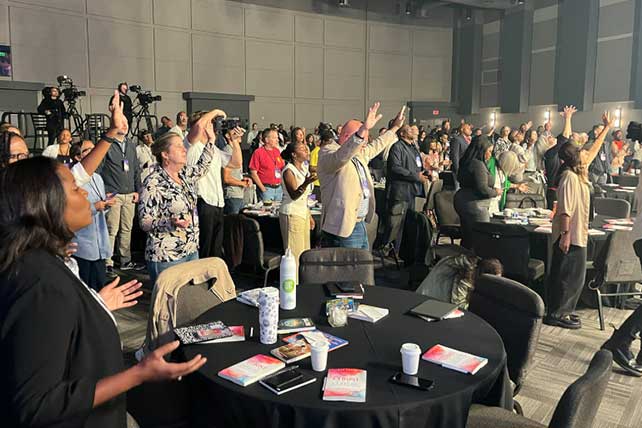One training, Reconciliation 301, invites participants to reflect on their own racist behaviors. The “Southern Justice experience” takes faith leaders to Alabama’s historic sites. After visiting Selma’s Edmund Pettus Bridge, where peaceful activists demanding civil rights were beaten in 1965, the training cohorts go to Birmingham’s 16th Street Baptist Church, where four Black girls died in a bombing orchestrated by Ku Klux Klan members in 1963.
And starting this year, OneRace added another training to its offerings. In partnership with World Relief, the “Southern Border Experience: San Diego & Tijuana” takes faith leaders to the U.S.-Mexico border to observe border issues and meet activists advocating for migrants’ rights.
The conference also served as an occasion for faith leaders to discuss the fatigue that comes with tackling race-related issues in their congregations.
Dennis Rouse, the 67-year-old founding pastor of Victory Church, formerly Victory World Church, a nondenominational megachurch with multiple Georgia locations, shared candidly about losing touch with white Christian friends when he established the multiethnic congregation in the 1990s. Still, the desire to create a truly unified church surpassed those challenges.
“If you’re going to be a true Christian, you can’t hold prejudice in your heart against another people,” he said before urging leaders to rely on God when feeling discouraged by the work.
Similarly, Loritts, who became pastor of Fellowship Bible Church in 2005, when the congregation was majority white, reflected on the fatigue that comes with being perceived as a “token” and “sellout,” as the Black pastor of a white congregation. Though multicultural congregations embody the unifying message of the gospel, Christians shouldn’t fixate on multiethnic congregations as a “strategy” or a “brand,” he said.
“I didn’t come to Fellowship as a racial experiment,” Loritts said. “I came to do the Lord’s work.”
Musicians perform during the Change the Story conference presented by OneRace, Thursday, Aug. 14, 2025, at Victory Church in Norcross, Ga. (RNS photo/Fiona André)
The speakers also noted the importance of multiethnic churches representing the congregations’ diversity in leadership, pastoral staff and worship teams.
At the core of OneRace’s approach to racial reconciliation is rejecting political etiquette, which many speakers drew attention to throughout the day. Though the movement centers racial justice, it is adamant about not taking sides politically.
Derwin Gray, founding pastor of Transformation Church in Indian Land, South Carolina, and author of the 2022 book “How to Heal Our Racial Divide,” urged leaders to preach boldly on issues — even if it means antagonizing “Democrats and MAGA.”
The AND Campaign, a nonpartisan civic organization that invites Christians to transcend partisan polarization, is a OneRace partner and sent representatives to the conference. AND Campaign Director Justin Giboney said from the stage that racism has wrongfully become politically polarizing for Christians.
“The race debate in much of the church has become a battle between those blind to the sin of racism and those who believe racism and sexism are the only sins,” he said.
Kim, of the NEA, told RNS that racism is not a political issue but a sin that “breaks the heart of Jesus” and that it has been a challenge for the church for millennia.
The conference also drew attention to similarities between how the church has handled racism and how it handles anti-immigrant hatred. Reza, director of U.S./Mexico border engagement for World Relief, a Christian humanitarian organization, urged attendees to not turn a blind eye to the fate of Latino Christian communities impacted by the federal government’s crackdown on immigration.
Noting that the hurt racism has caused Black Christian communities mirrors the experiences of Latino Christians who feel abandoned by fellow Christians now, Reza implored attendees to stand in support of those communities.
“We, I, need you all to be the church,” said Reza, as she shed tears, adding, “Black brothers and sisters, do not turn a blind eye.”
This article originally appeared here.


